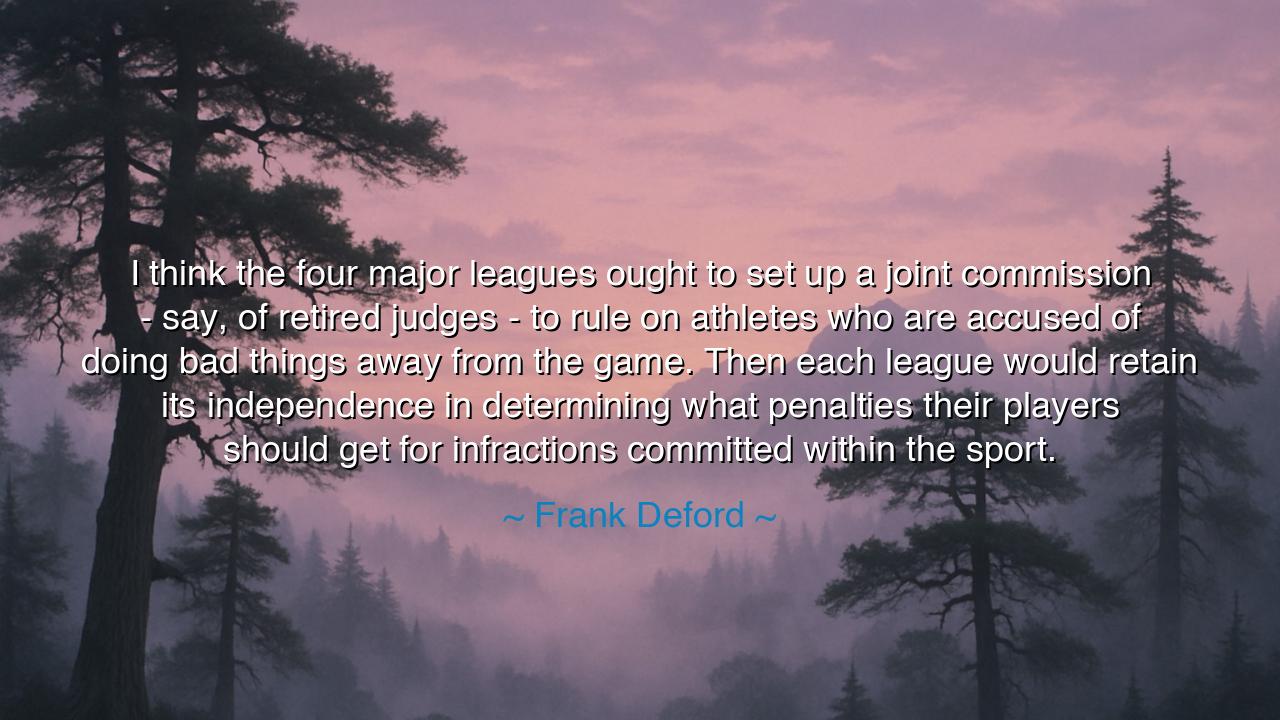
I think the four major leagues ought to set up a joint commission
I think the four major leagues ought to set up a joint commission - say, of retired judges - to rule on athletes who are accused of doing bad things away from the game. Then each league would retain its independence in determining what penalties their players should get for infractions committed within the sport.






Listen, O children of the future, to the wisdom of Frank Deford, who speaks of a time-honored truth—the balance between justice and independence, fairness and authority. In his words, he proposes a solution to the modern dilemmas that plague the great leagues of sport: "I think the four major leagues ought to set up a joint commission—say, of retired judges—to rule on athletes who are accused of doing bad things away from the game. Then each league would retain its independence in determining what penalties their players should get for infractions committed within the sport." In these words, we hear a call for fairness, a plea for a system that both respects the autonomy of each sport and ensures a uniform standard of justice for all.
The story of justice is as old as the human race itself. From the time of the ancient Greeks, when the first courts were established, to the days of the Romans, who created a legal system that shaped the world for centuries, mankind has sought a way to balance authority and fairness. In those ancient days, when rulers were both kings and judges, it was often difficult to separate personal interests from the pursuit of justice. Yet, the need for impartiality in judgment was universally acknowledged. As Solon, the Athenian legislator, famously stated, "Justice is the constant and perpetual will to allot to every man his due." This notion—that fairness must rise above the biases of personal power—lies at the heart of Deford's call for a joint commission to rule on off-field conduct.
Consider, O children, the example of the Roman Senate, a body that, despite being made up of powerful men, understood the importance of separating personal power from public duty. When Julius Caesar sought to overstep his boundaries and consolidate power, it was the Senate, though fraught with its own complexities, that stood as the institution capable of bringing balance to the state. But Caesar's rise and fall remind us that even in the pursuit of justice, we must be vigilant against the corrupting forces of unchecked power. This is the wisdom Deford seeks to restore—an impartial commission, free from the interests of the leagues themselves, to ensure that justice is meted out equally, without bias, when athletes step outside the realm of the game.
In the modern world, sports have become much more than simple games—they are, in fact, microcosms of society itself. The athletes who grace the fields and courts of these great leagues are more than mere competitors; they are role models, public figures whose actions on and off the field can ripple through society. Yet, as Deford points out, it is important to maintain the independence of each league while ensuring that the penalties for misdeeds off the field are not dictated by personal biases or the influence of corporate interests. The integrity of each sport must remain intact, just as the integrity of justice must remain above reproach.
Consider the story of Jackie Robinson, whose legendary career with the Brooklyn Dodgers transcended the sport itself. Robinson faced countless injustices off the field, from racism to personal attacks, yet his commitment to fairness and integrity on the field changed the landscape of American sports forever. His story teaches us that athletes, though deserving of the independence of their sport, are still bound by the wider laws of society—laws that must ensure fairness for all. Deford’s proposal, that retired judges should weigh in on off-field behavior, seeks to bring a sense of order to the chaos that often arises when sports and society collide.
In your own lives, O children, take heed of this wisdom. Justice is not merely about following rules; it is about ensuring that those rules are applied equally to all, regardless of their status or power. In your pursuit of independence, remember that true freedom is never absolute—it exists only when tempered with the wisdom of fairness and the understanding that no one is above the law. Just as Deford calls for a system that respects both the autonomy of the leagues and the need for impartial judgment, so too must you strive for balance in your own life—between your own rights and the rights of others.
So, let this lesson endure: when you are faced with questions of fairness, of justice, do not look for answers that serve your own interests alone. Seek a higher truth, one that ensures balance, respect, and independence for all. Just as the major leagues must ensure that athletes are judged fairly both on and off the field, so too must we hold ourselves accountable to the principles of fairness, even in the most personal of matters. For only then can true justice prevail, and only then can independence be fully realized, not in isolation, but in harmony with the greater good.






AAdministratorAdministrator
Welcome, honored guests. Please leave a comment, we will respond soon